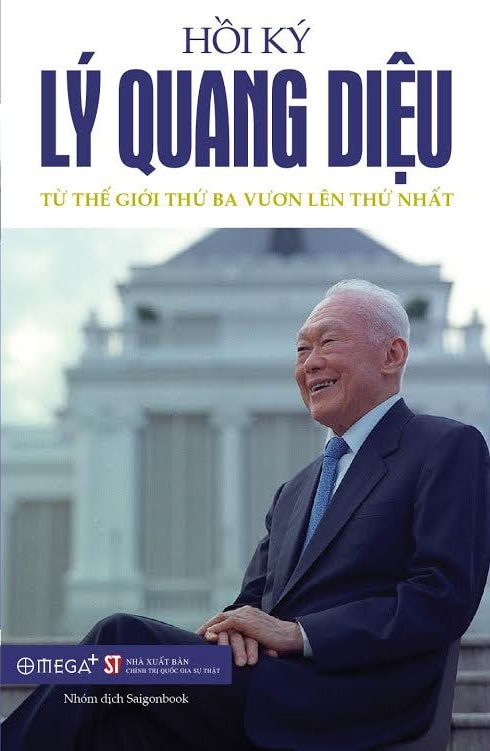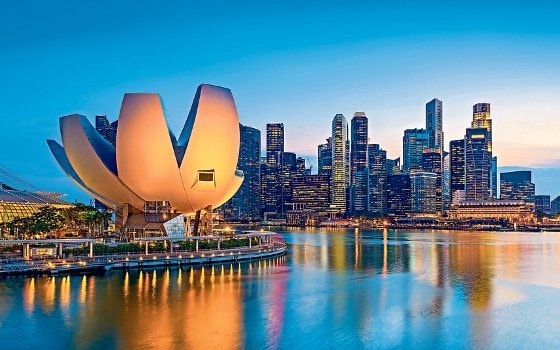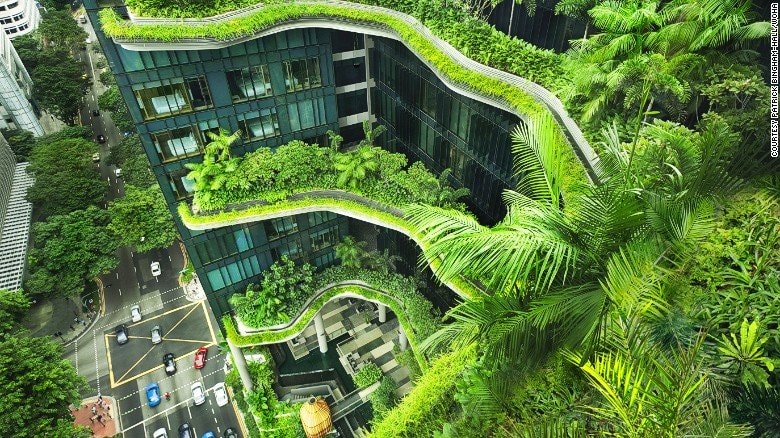The story of Mr. Lee Kuan Yew's handling of street vendors
“We would not be considered an educated, cultured society if we were not ashamed to start trying to become an educated, cultured society in the shortest possible time.”
From the story of dealing with street vendors, pollution, rude behavior in public places to the process of greening the country, preserving history... all were recorded by Mr. Lee Kuan Yew. To commemorate the second anniversary of his death (March 23, 2015) and on the occasion of Prime Minister Lee Hsien Loong's visit to Vietnam, we would like to introduce to readers a few snippets from the memoirs of the "founding father" of Singapore.
After independence, I looked for some way to differentiate ourselves from other Third World countries. I settled for a clean and green Singapore. The aim of this strategy was to make Singapore an oasis in Southeast Asia, because if we had First World standards, businessmen and tourists would choose us as a base for their business and as a tourist destination.
Basic infrastructure is easier to improve than the rough manners of the people. Many of them have moved from makeshift toilets… to high-rise apartments with modern sanitation, but their behavior remains the same. We have had to work hard to eliminate littering, loud noises and rude attitudes, and to guide people to be more considerate and polite.
 |
| Volume 2 of Lee Kuan Yew's Memoirs will be released soon. |
We started from a low base. In the 60s, thousands of people lined up at our public meetings... Unemployed people, along with their wives and children, applied for jobs, like taxi driving or street vendor licenses, or the right to sell food in school canteens.
This is the human side of unemployment statistics. Thousands of street vendors disregard traffic, health, and other considerations. Garbage, the stench of rotting food, and the noise of chaos have turned many areas of the city into slums.
Some businessmen rent out their old private cars to people who become “hijack taxi drivers”, without a license and without insurance… They stop without signaling, pick up and drop off passengers indiscriminately and have become a threat to many other road users.
We could not clean up the city by removing the street vendors and illegal taxis for many years. Only after 1971, when we had created jobs, could we enforce the law and clean up the streets. We issued business licenses to street vendors and moved them from the roadside to a street vendor center with water, sewerage and garbage disposal.
It was not until the early 80s that we re-established all the street vendors… The illegal taxi drivers were driven off the streets only after we re-organized the bus system to serve them and gave them other jobs…
To achieve First World standards in a Third World region, we set out to transform Singapore into a tropical garden city… I concluded that we needed an office with the expertise to care for the trees after they had been planted. I set up such an office within the Ministry of National Development.
After some promotion, I met with all the senior officials in the government and legislative bodies to urge them to join the “clean and green” movement…
We planted millions of trees: palm trees, shrubs. The green boosted people's spirits and they took pride in their neighborhoods. We also taught them how to care for the trees without destroying them…
|
| Vast green spaces on Singapore's buildings. |
Perseverance and endurance are necessary to break old bad habits: People step on trees, trample on grass, pick flowers, steal saplings, or lean bicycles or motorbikes on bigger ones, causing them to fall over… To overcome indifference in public places, we educate children in school by teaching them to plant trees, care for them, and grow gardens. They also have to take notice home to their parents…
In preparation for the Commonwealth Prime Ministers' meeting in mid-January 1971... we gave detailed instructions to the service sector, shopkeepers, taxi drivers, and staff in hotels and restaurants to try their best to be more polite and friendly. They reciprocated and the response from the visiting Prime Ministers, Presidents, and their entourages was very good.
Encouraged by this, the Tourism Development Board launched a campaign to be courteous and gracious to shopkeepers and other staff in the service trade. I intervened. It would be ridiculous if our service staff were only courteous to tourists but not to Singaporeans.
I convene the Ministry of Defence which is responsible for the National Army, the Ministry of Education which manages over half a million students, and the National Trade Union Congress with several hundred thousand workers to spread the message that civility must become our way of life, making Singapore a playground for ourselves...
You can test a city’s pollution levels by its vegetation. Where the fumes from old cars, buses, and diesel trucks exceed the permitted levels, the bushes are covered with black soot particles, withered and dead…
I decided to set up an anti-pollution team as part of my office. We placed quality control instruments along busy roads to measure dust and smoke density as well as sulfur dioxide (S02) emissions from vehicles…
Singapore's size forces us to work, play, and live in the same confined space, which makes it imperative that we maintain a clean and harmonious environment for rich and poor alike…
 |
| Singapore today. |
In the 1960s, the pace of urban regeneration accelerated. We went through a period of bold demolition of the old city centre and rebuilding of a new one. By the late 1970s, we were growing restless with the pace at which we were erasing our past, so in 1971, we set up a Monumental Buildings Conservation Board to identify and preserve historic, traditional, archaeological, architectural, or art-related buildings, and administrative, cultural and commercial buildings that were significant in Singapore's history... We sought to preserve Singapore's character to commemorate the past...
Since the 1970s, to save the addicted and the corrupt, we have banned cigarette advertising. Gradually, we have banned smoking in public places - in elevators, buses, in stations and on MRT (Mass Rapid Transit) trains, and even in air-conditioned offices and restaurants…
The chewing gum ban brought us a lot of ridicule in the US… At first, I thought it was too harsh. But after vandals stuck chewing gum into the sensors of the MRT train doors, causing the system to malfunction… Prime Minister Goh and his colleagues decided to enact the ban in January 1992…
Foreign journalists in Singapore have not found any major corruption scandals or serious illegal activities to report. Instead, they have reported enthusiastically and frequently on “do good” campaigns, mocking Singapore as a “nanny state”. They laugh at us.
But I am confident. If we had not made an effort to persuade people to change their way of life, we would have been a more vulgar, more vulgar, more vulgar society. We would not be considered a cultured, educated society if we were not ashamed to start trying to become a cultured, educated society in the shortest possible time.
First, we educated and mobilized the people. Then we persuaded and appealed to the majority, and we legislated to punish the recalcitrant minority. This made Singapore a more pleasant place to live. If this is a “nanny state”, I am proud to have nurtured it.
According to Vietnamnet.vn
| RELATED NEWS |
|---|

